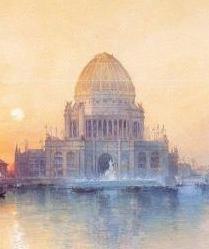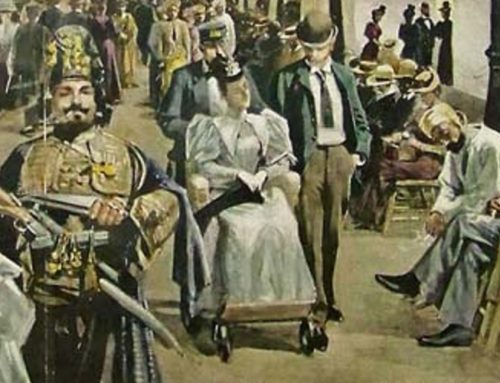America’s favorite futurist fustigated the Fair.
“The underlying motive of the whole exhibition, under a sham pretense of patriotism is business, advertising with a view to individual money-making,” wrote Edward Bellamy (March 26, 1850 – May 22, 1898) about the 1893 World’s Columbian Exposition.
Bellamy’s 1888 novel Looking Backward: 2000–1887 was among the most popular and influential writings of the Gilded Age. His protagonist Julian West falls asleep in 1887 and awakens in 2000, when the United States has been transformed into a socialist utopia. (Spot on, Edward!) Following the commercial success of this novel, Bellamy established The New Nation, a newspaper dedicated to promoting the socialist cause of nationalizing American industry.
At the time of the 1893 World’s Fair, Looking Backward was selling 1000 copies a month, Bellamy reported. The Columbian Exposition’s focus on Progress-with-a-capital-P offered Bellamy the opportunity to return to his exercise in futurism and pen a short editorial about a World’s Fair in the year 2000 … and an opportunity to remind his readers of the title of his best-seller, slyly inserted in the second paragraph. The reprint below appeared in The New Nation on May 6, 1893.

Edward Bellamy, c. 1889. [Image from the Library of Congress.]
The World’s Fair of 1893 and the World’s Fair of A.D. 2000.
The Columbian World’s Fair at Chicago was opened this week. There is a certain propriety in the occurrence of the exhibition at this time quite aside from its being the fourth centenary of the discovery of the country. The world is about to abandon the competitive for the co-operative, the despotic for the democratic system of industry. We stand the mind and heart of man. It will be regarded by future on the verge of this prodigious charge, so long demanded by generations as historically fitting that just at the close of the competitive epoch this great exhibition should have been given of the best, finest and greatest it could accomplish. The display is doubtless a fine one and marks a high degree of progress as compared with the best that could have been done under the system of feudal serfdom which prevailed in Columbus’ day. But even as meanly and pitiably in all respects as a world’s fair in Queen Isabella’s day would compare with that at Chicago, even so may we expect that will compare with the world’s fair to be held maybe in the year 2000 to celebrate the material progress of the world in the first century of the era of fraternal co-operation upon the basis of equality.
But, though thanks to a system of scientific and concerted production, the world of the future will compare with that of today in point of wealth as a prince to a pauper, we may be sure that to our posterity, looking backward, the material progress made since 1893 will seem far less important than the moral advance. At Chicago the exhibits of pomp and luxury and art represent not the enjoyments of the many but of the wealthy few. The wonderful mechanical display presented does not stand for powers used for and by the people for the common welfare, but for devices whereby capitalists enrich themselves and rule their fellow men. The underlying motive of the whole exhibition, under a sham pretense of patriotism is business, advertising with a view to individual money-making.
If a world’s fair is held in the year 2000 it will reflect in its display of art and luxury not merely enjoyments attainable by a few, but the condition of the masses. The exhibits of machinery and of the achievements of men in yoking the forces of nature, will represent triumphs redounding not chiefly to the advantage of captains of industry and owners of capital, but to the equal service of all. The underlying purpose of the fair in the year 2000, moreover, will not be business advertising for the purpose of individual money-making, but the desire, without sordid or selfish aims of any sort, to furnish the nations an opportunity to learn from one another, to rejoice in and share one another’s gains, that humanity may advance with even step.

Edward Bellamy’s Looking Backward remained popular in 1893, when this advertisment appeared in the December 28 issue of the New York Tribune.





Leave A Comment